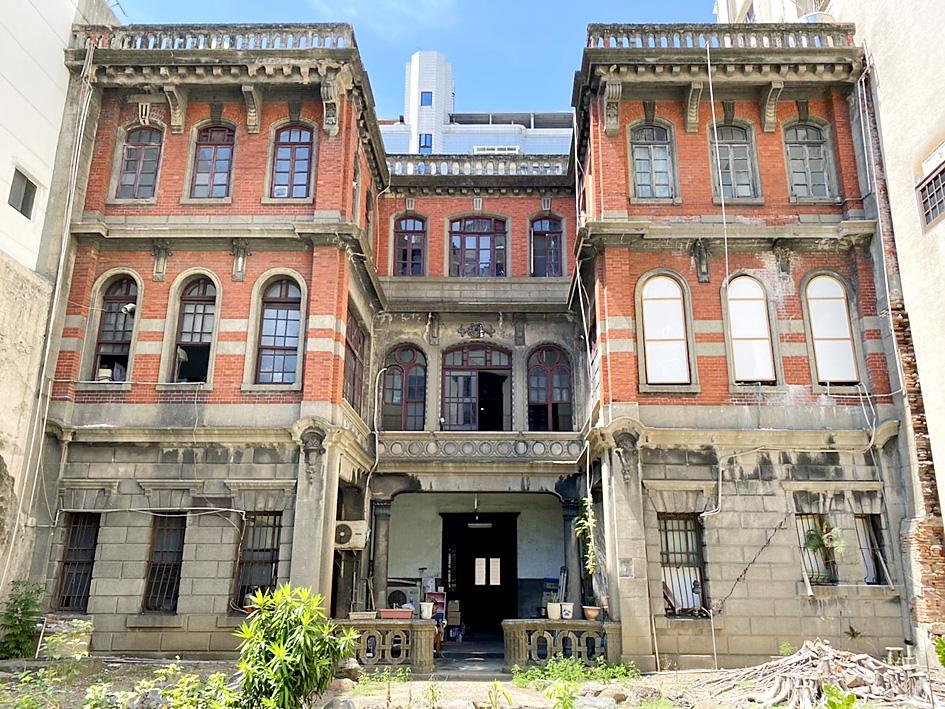The historic Chen Tien-lai Residence (陳天來故居) — the abandoned former home of a wealthy tea merchant — is finally to be restored by the Taipei City Government after years of property disputes, the city said yesterday.
The three-story mansion in Taipei’s Dadaocheng (大稻埕) area was the home of Chen and his family during the Japanese colonial era, but went unused in the decades that followed due to property disputes among surviving family members.
Concerned about the declining condition of the building, the Taipei Department of Cultural Affairs invoked Article 28 of the Cultural Heritage Preservation Act (文化資產保存法), which allows the city to take over a historic property if it is deteriorating due to the mismanagement of its owners, the city said.

Photo: Tang Hsin-hui, Taipei Times
The city’s plan to restore the building would cost NT$200 million (US$6.9 million), and work would start by October next year, with plans to finish by 2024, it said.
The budget includes NT$130 million to restore the building itself, NT$40 million to repair the surrounding property, and NT$30 million to restore historic artifacts in and around the building, it said.
The city would provide 80 percent of the funds, while the Chen family would provide the remaining 20 percent.
The building’s decorative columns, window frames and archways — made in a Victorian architectural style — would all need to be restored to their original appearance, professor and architect Hsu Yu-chien (徐裕健) said.
The city plans to open the space to the public once the restoration is completed, Hsu said.
“What the Chen Tien-lai Residence represents is not only Chen’s prosperity, but also the prosperity of Taipei and of Dadaocheng,” department Deputy Commissioner Tien Wei (田瑋) said.
The city has targeted 2024 as the completion date to mark the 100-year anniversary of the mansion’s construction, which ended in 1924, he said.
Speaking to reporters, Chen family members said that they had always wanted to restore the property, but disagreements on how to proceed had prevented any progress.
The family is grateful for the city’s involvement and hope the building could become a public center for cultural learning, they said.
“The Chen Tien-lai Residence is the most classic piece of architecture in all of Dadaocheng. The rock installation in its garden especially must be preserved,” cultural preservationist Mi Fu-kuo (米復國) said.
During restoration it would be a good idea to install a low perimeter wall around the property to lend it an air of “mysteriousness” and attract attention from passersby, cultural preservationist Chiu Ju-hua (丘如華) said.

Taiwan has received more than US$70 million in royalties as of the end of last year from developing the F-16V jet as countries worldwide purchase or upgrade to this popular model, government and military officials said on Saturday. Taiwan funded the development of the F-16V jet and ended up the sole investor as other countries withdrew from the program. Now the F-16V is increasingly popular and countries must pay Taiwan a percentage in royalties when they purchase new F-16V aircraft or upgrade older F-16 models. The next five years are expected to be the peak for these royalties, with Taiwan potentially earning

STAY IN YOUR LANE: As the US and Israel attack Iran, the ministry has warned China not to overstep by including Taiwanese citizens in its evacuation orders The Ministry of Foreign Affairs (MOFA) yesterday rebuked a statement by China’s embassy in Israel that it would evacuate Taiwanese holders of Chinese travel documents from Israel amid the latter’s escalating conflict with Iran. Tensions have risen across the Middle East in the wake of US and Israeli airstrikes on Iran beginning Saturday. China subsequently issued an evacuation notice for its citizens. In a news release, the Chinese embassy in Israel said holders of “Taiwan compatriot permits (台胞證)” issued to Taiwanese nationals by Chinese authorities for travel to China — could register for evacuation to Egypt. In Taipei, the ministry yesterday said Taiwan

Taiwan is awaiting official notification from the US regarding the status of the Agreement on Reciprocal Trade (ART) after the US Supreme Court ruled US President Donald Trump's global tariffs unconstitutional. Speaking to reporters before a legislative hearing today, Premier Cho Jung-tai (卓榮泰) said that Taiwan's negotiation team remains focused on ensuring that the bilateral trade deal remains intact despite the legal challenge to Trump's tariff policy. "The US has pledged to notify its trade partners once the subsequent administrative and legal processes are finalized, and that certainly includes Taiwan," Cho said when asked about opposition parties’ doubts that the ART was

If China chose to invade Taiwan tomorrow, it would only have to sever three undersea fiber-optic cable clusters to cause a data blackout, Jason Hsu (許毓仁), a senior fellow at the Hudson Institute and former Chinese Nationalist Party (KMT) legislator, told a US security panel yesterday. In a Taiwan contingency, cable disruption would be one of the earliest preinvasion actions and the signal that escalation had begun, he said, adding that Taiwan’s current cable repair capabilities are insufficient. The US-China Economic and Security Review Commission (USCC) yesterday held a hearing on US-China Competition Under the Sea, with Hsu speaking on